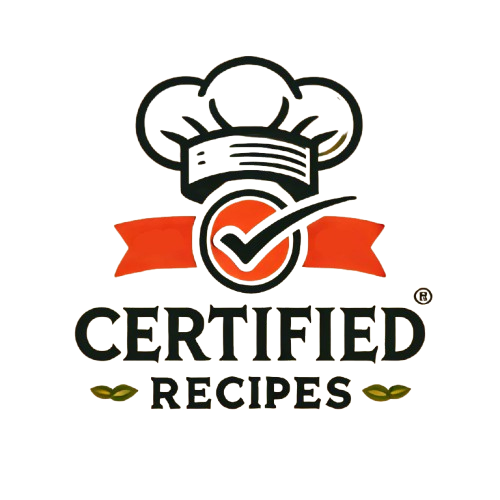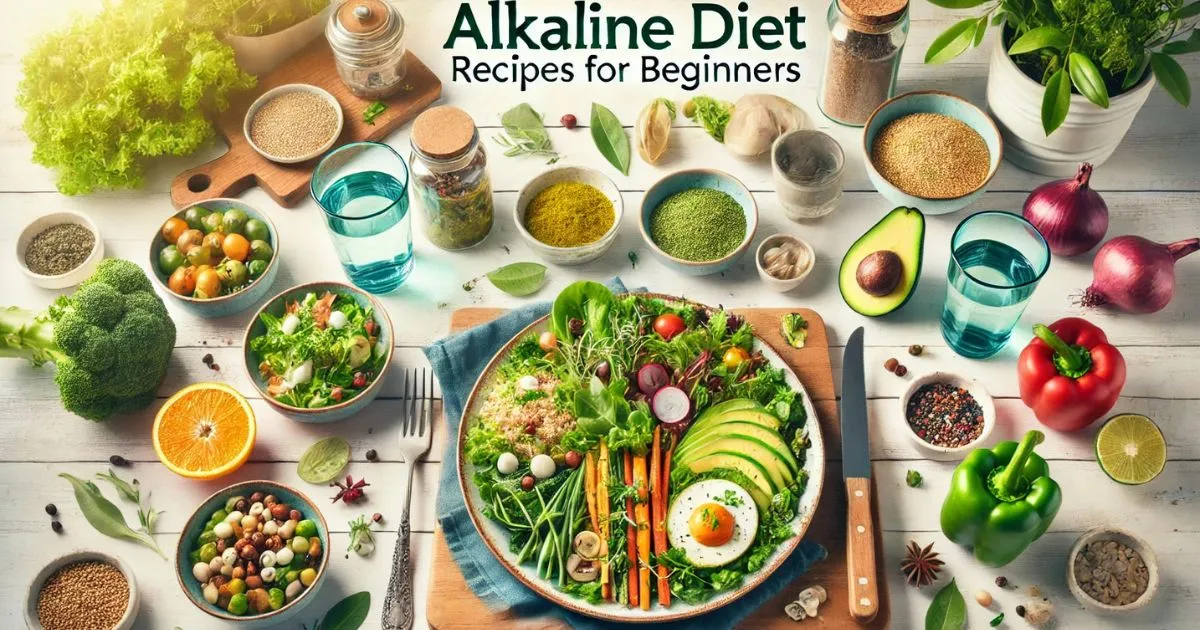Starting an alkaline lifestyle can be exciting but also a bit scary. That’s why we’ve put together five simple, tasty alkaline meal recipes for beginners. These recipes help you add alkaline foods to your diet. This can boost your energy, improve digestion, and make you feel great.
In this article, you’ll learn the basics of the alkaline diet and its health perks. You’ll also find out about the kitchen tools and ingredients you need for alkaline cooking. Then, you’ll get to make delicious, healthy meals with our easy recipes.
Table of Contents
Key Takeaways
- Discover five easy-to-prepare alkaline meal recipes for beginners
- Understand the basic principles of the alkaline diet and its potential health benefits
- Learn about the essential kitchen tools and ingredients needed for alkaline cooking
- Explore simple preparation methods and portion control guidelines for maintaining an alkaline lifestyle
- Get inspired to incorporate more alkaline-forming foods into your daily routine
Understanding the Alkaline Diet Basics
The alkaline diet focuses on keeping your body’s pH balance right. It involves eating foods that help neutralize acid in your body. This can lead to better health.
Benefits of Following an Alkaline Diet
Following an alkaline diet can bring many benefits. These include:
- Reduced inflammation and improved immune function
- Better bone health and reduced risk of osteoporosis
- Increased energy levels and improved digestion
- Potential support for weight management and reduced risk of chronic diseases
Common Alkaline-Forming Foods
The diet focuses on whole, plant-based foods. These foods are packed with essential minerals such as potassium, calcium, and magnesium. Some key foods are:
- Leafy greens (e.g., spinach, kale, Swiss chard)
- Cruciferous vegetables (e.g., broccoli, cauliflower, Brussels sprouts)
- Citrus fruits (e.g., lemons, limes, oranges)
- Nuts and seeds (e.g., almonds, walnuts, chia seeds)
- Healthy fats (e.g., avocados, olive oil, coconut oil)
Foods to Avoid on an Alkaline Diet
The diet also suggests avoiding certain foods. These foods can upset your body’s pH balance. Some foods to limit or avoid are:
- Processed and refined foods (e.g., white bread, pastries, sugary snacks)
- Meat, poultry, and fish (in moderation)
- Dairy products (in moderation)
- Alcohol and caffeine
By learning about the alkaline diet and eating more alkaline meal recipes, you can improve your health. This can lead to a better life overall.
Essential Kitchen Tools and Ingredients for Alkaline Cooking
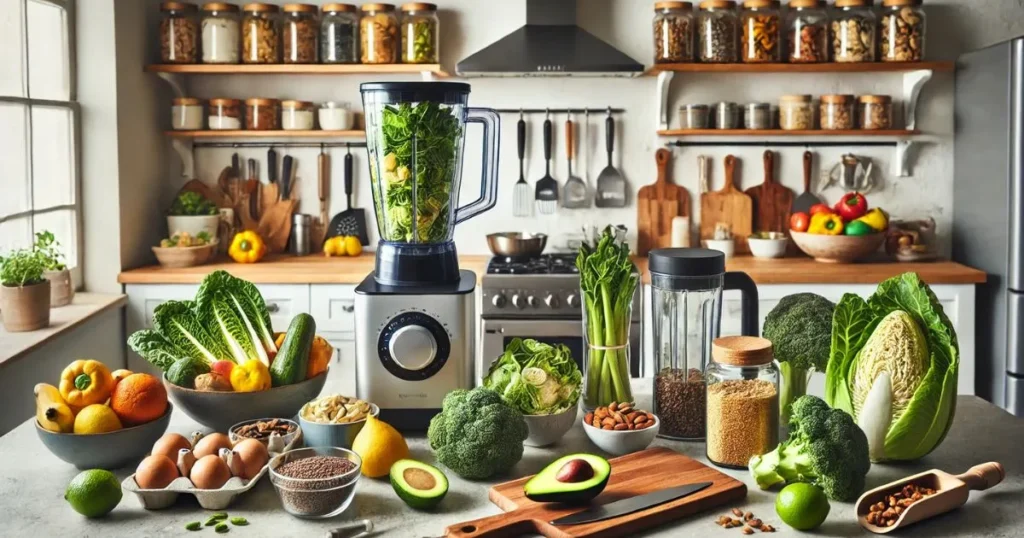
Preparing alkaline meal recipes at home needs a well-stocked kitchen. The right equipment and ingredients make it easier. This way, your alkaline meal prep recipes and recipes for alkaline meals will be tasty and healthy.
Here are the essential kitchen tools and ingredients for [alkaline meal recipes] cooking:
- High-quality blender or food processor for smoothies, sauces, and dressings
- Spiralizer or julienne peeler for vegetable noodles and ribbons
- Reusable glass or BPA-free plastic containers for meal prepping and storage
- A variety of cutting boards, knives, and kitchen utensils for different produce
For ingredients, focus on alkaline meal recipes like:
- Leafy greens (spinach, kale, swiss chard)
- Cruciferous vegetables (broccoli, cauliflower, brussels sprouts)
- Avocados, lemons, and limes
- Nuts and seeds (almonds, walnuts, chia, flax)
- Quinoa, brown rice, and other whole grains
With the right tools and ingredients, you’re ready to make tasty and healthy alkaline meal recipes and recipes for alkaline meals easily.
Quick Alkaline Breakfast Bowl Recipe
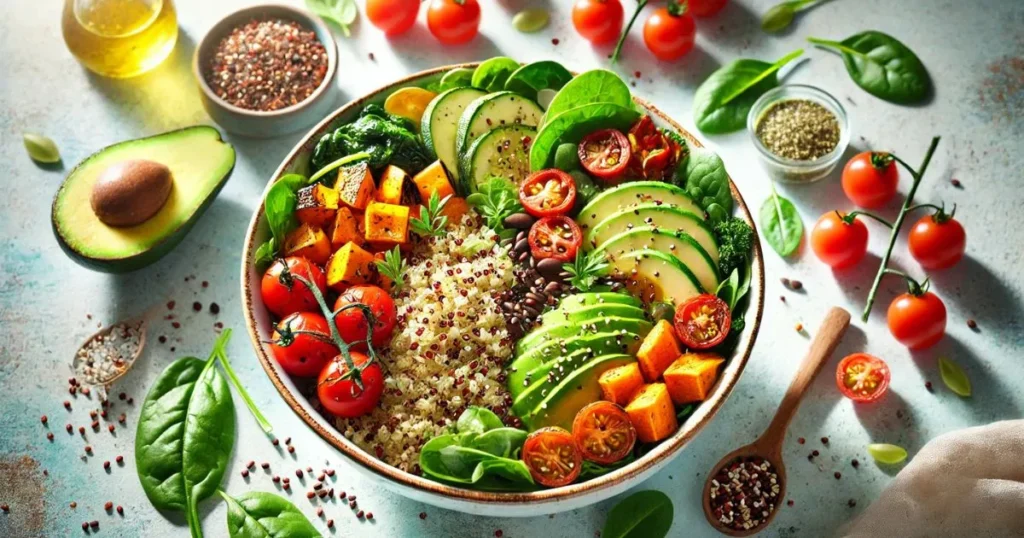
Start your day with a nourishing and alkaline-boosting breakfast bowl! This easy recipe is full of nourishing, wholesome ingredients. It will energize your body and kickstart your metabolism. Let’s dive in and discover the tasty details.
Ingredient Substitutions
The appeal of this recipe lies in its flexibility. Feel free to substitute ingredients according to your dietary preferences or what you have available. For instance, you can replace the quinoa with other alkaline-forming grains like millet or amaranth. Swap the spinach for kale or mixed greens, and the avocado for sliced cucumber or cherry tomatoes.
Storage and Meal Prep Tips
This breakfast bowl is perfect for meal prepping. You can prepare the components in advance and assemble it fresh each morning. Store the cooked quinoa, roasted vegetables, and dressing separately in the refrigerator for up to 4 days. When ready to enjoy, simply combine the ingredients and top with a drizzle of the zesty dressing.
Nutritional Benefits
This alkaline breakfast bowl is a powerhouse of nutrients. The quinoa provides complex carbohydrates, protein, and fiber, while the vegetables offer a wealth of vitamins, minerals, and antioxidants. The avocado adds healthy fats to keep you feeling satisfied. Together, these ingredients create a balanced and alkaline-friendly meal to start your day off right.
| Nutrient | Amount per Serving |
|---|---|
| Calories | 350 |
| Protein | 12g |
| Carbohydrates | 45g |
| Fiber | 8g |
| Healthy Fats | 15g |
Refreshing Green Alkaline Smoothie
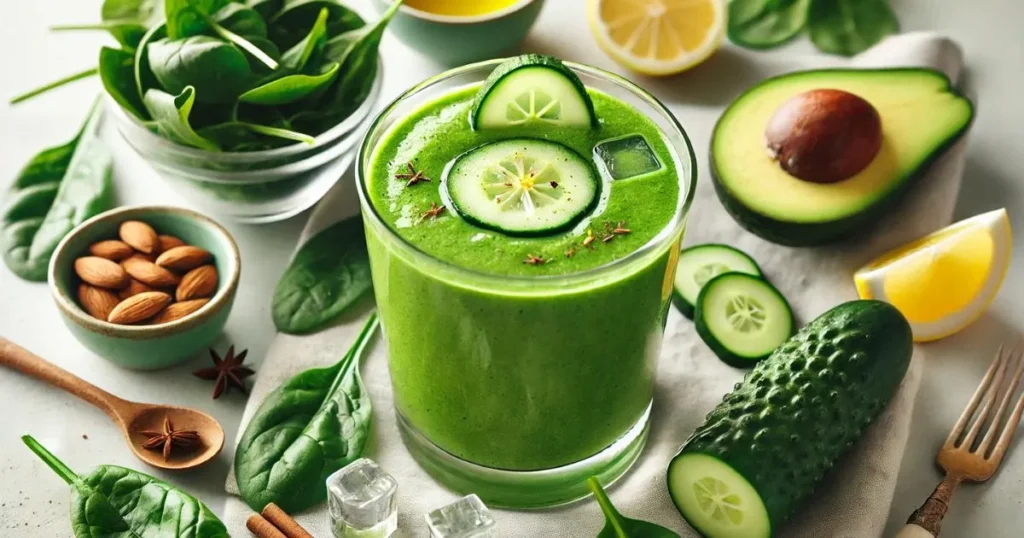
Try this refreshing green smoothie for a boost of alkaline power. It’s perfect for starting your day or a quick pick-me-up. It’s a tasty way to follow your alkaline diet.
Ingredients:
- 1 cup spinach or kale
- 1 cup cucumber, chopped
- 1/2 avocado
- 1 cup unsweetened almond milk
- 1 tablespoon freshly squeezed lemon juice
- 1 teaspoon honey (optional)
- 1 cup ice cubes
Preparation:
- Put the spinach or kale, cucumber, avocado, almond milk, lemon juice, and honey (if using) in a blender.
- Blend all the ingredients on high until the mixture is smooth and creamy.
- Add ice cubes and blend until it’s cold and the right consistency.
- Drink it right away from a glass.
This green smoothie is full of alkaline nutrients. It helps balance your body’s pH. The mix of greens, avocado, and lemon is refreshing and filling.
| Nutrient | Amount per Serving |
|---|---|
| Calories | 250 |
| Protein | 5g |
| Fiber | 9g |
| Vitamin C | 40% DV |
| Vitamin K | 200% DV |
| Magnesium | 15% DV |
Drink this smoothie for a refreshing taste and to support your alkaline diet. It’s a tasty way to add more alkaline foods to your day.
Alkaline Meal Recipes for Everyday Wellness
Adding alkaline meals to your daily routine boosts health and wellness. These alkaline meals recipes are both healthy and easy to fit into a busy schedule.
Time-Saving Preparation Methods
Meal prepping is a big help for keeping up with alkaline meal prep recipes. Spend a few hours on the weekend to prep parts of meals for the week. This means chopping veggies, cooking grains, and making sauces ahead of time.
Using a slow cooker or Instant Pot is also a smart move. Just add your ingredients, set the timer, and come back to a ready-to-eat meal.
Portion Control Guidelines
It’s important to keep portion sizes right on an alkaline diet. Here are some guidelines:
- Vegetables: Aim for 2-3 cups per meal
- Protein: 4-6 ounces of lean protein per serving
- Grains or starchy vegetables: 1/2 to 1 cup per serving
- Healthy fats: 1-2 tablespoons per meal
Following these portions helps you enjoy full and balanced alkaline meal recipes. They support your health goals.
| Alkaline Meal recipes Component | Recommended Portion Size |
|---|---|
| Vegetables | 2-3 cups per meal |
| Protein | 4-6 ounces per serving |
| Grains/Starchy Vegetables | 1/2 to 1 cup per serving |
| Healthy Fats | 1-2 tablespoons per meal |
Mediterranean-Style Alkaline Quinoa Bowl
Discover the delightful blend of flavors and alkaline-boosting nutrients in this Mediterranean-inspired quinoa bowl. This versatile dish is not only visually appealing but also packed with ingredients that can help maintain a healthy alkaline balance in your body.
Ingredients:
- 1 cup cooked quinoa
- 1 cup cherry tomatoes, halved
- 1 cucumber, diced
- 1/2 cup kalamata olives, pitted and sliced
- 1/4 cup crumbled feta cheese
- 2 tablespoons fresh parsley, chopped
- 2 tablespoons fresh lemon juice
- 1 tablespoon extra-virgin olive oil
- 1/2 teaspoon dried oregano
- Salt and freshly ground black pepper to taste
Instructions:
- Cook the quinoa according to package instructions and allow it to cool slightly.
- In a large bowl, mix together the cooked quinoa, cherry tomatoes, cucumber, kalamata olives, feta cheese, and parsley.
- In a small bowl, whisk together the lemon juice, olive oil, oregano, salt, and pepper until well combined.
- Drizzle the dressing over the quinoa mixture and toss gently to coat everything evenly.
- Serve the Mediterranean-style alkaline quinoa bowl chilled or at room temperature.
This alkaline meal recipes is a delightful way to incorporate more alkaline meal recipes into your diet. The combination of quinoa, fresh vegetables, and a bright Mediterranean-inspired dressing creates a nutrient-dense and satisfying dish that can help support your overall health and alkalinity.
| Nutrient | Amount per Serving |
|---|---|
| Calories | 320 kcal |
| Protein | 12 g |
| Fiber | 7 g |
| Vitamin C | 25 mg |
| Magnesium | 120 mg |
Enjoy this Mediterranean-Style Alkaline Quinoa Bowl as a nourishing and satisfying meal that supports your alkaline diet journey.
Zucchini Noodles with Avocado Sauce
Looking for alkaline-friendly meals? Try this tasty zucchini noodle dish with creamy avocado sauce. It’s a healthy swap for regular pasta and simple to make.
Sauce Variations
The avocado sauce is the main attraction. But, you can tweak it to your liking. Add lemon juice for a zesty kick or fresh herbs like basil for more flavor. For a richer sauce, mix in some unsweetened almond milk.
Serving Suggestions
- Enjoy the zucchini noodles and avocado sauce as a main course. Top with cherry tomatoes, cucumber slices, and toasted pine nuts.
- Turn the noodles and sauce into a veggie-packed salad. Add sautéed mushrooms, shredded carrots, and balsamic glaze for extra taste.
- Pair the noodles with grilled chicken or baked salmon for a filling, alkaline meal recipes.
Get creative with this alkaline meal recipes and find new ways to enjoy it. Whether you’re new to the alkaline diet or a seasoned pro, this zucchini noodle dish will quickly become a favorite.
Tips for Maintaining an Alkaline Diet Long-Term
Starting an alkaline diet can greatly improve your health. But, it’s important to keep it up over time. Start by planning your meals in advance. Look for online recipes or use meal prep services that focus on alkaline diets.
This approach helps you stay on track and eat the right foods. It ensures you get the right mix of alkaline foods.
When you eat out, look for alkaline-friendly options. Choose plant-based dishes, grilled or steamed proteins, and salads with lemon dressing. Being proactive helps you stick to your alkaline diet, even when you’re not at home.
Success with an alkaline diet comes from finding a method that fits your life. Try new recipes, find ingredients you love, and adjust your plan as needed. With creativity and dedication, you can make alkaline eating a part of your daily life. Enjoy its benefits for many years.
FAQ
What is the alkaline diet?
The alkaline diet is about eating foods that keep your body’s pH balance right. It supports your health and boosts your well-being. You eat more foods that make your body alkaline and less of the acidic ones.
What are the advantages of following an alkaline diet?
Eating alkaline can boost your energy and reduce inflammation. It also aids digestion and boosts your immune system. Plus, it might help you lose weight and lower the risk of serious diseases.
What are some common alkaline-forming foods?
Foods that are alkaline include veggies, fruits, nuts, seeds, and whole grains. Spinach, broccoli, avocado, almonds, and quinoa are some examples.
Which foods should you avoid on an alkaline diet?
Stay away from processed meats, dairy, refined carbs, and sugary foods. They’re acidic and can upset your body’s pH balance.
What essential kitchen tools and ingredients do I need for alkaline cooking?
You’ll need a good blender, spiralizer, and steamer for alkaline cooking. Keep fresh veggies, fruits, nuts, seeds, and healthy fats like avocado oil or coconut oil on hand.
How can I incorporate alkaline meal recipes into my daily routine?
Start with simple, healthy recipes that you can make ahead. Try an alkaline breakfast bowl or smoothie in the morning. Then, add alkaline-friendly meals to your lunch and dinner plans for the week.
